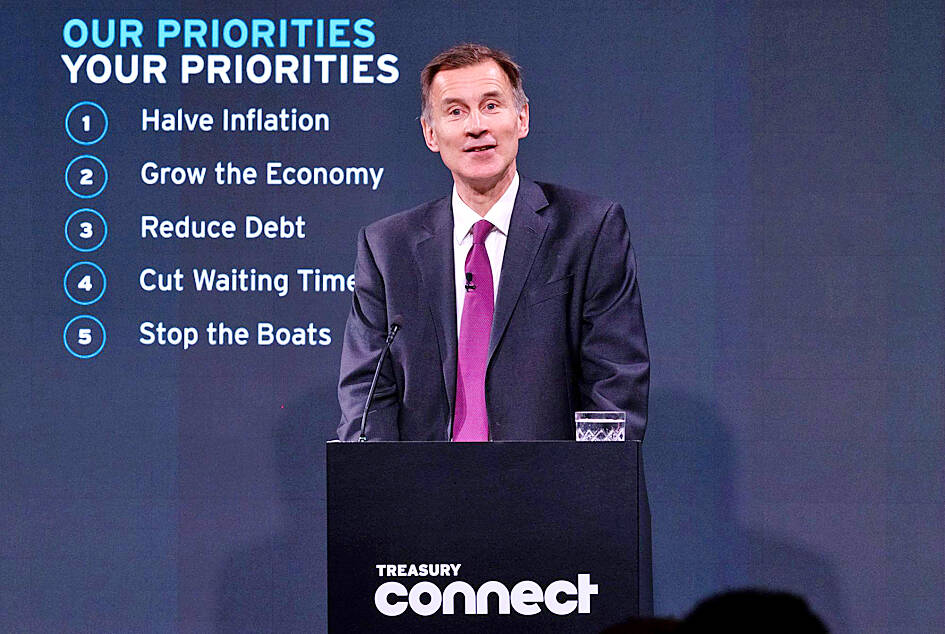The UK last year avoided a recession by the narrowest of margins after a cost-of-living crisis and strikes affected the economy in December.
GDP was unchanged in the fourth quarter following a revised 0.2 percent decline in the previous three months, the British Office for National Statistics said yesterday.
Output in December alone fell 0.5 percent.

Photo: Bloomberg
The figures meant that in the second half of last year, Britain dodged back-to-back quarterly contractions — the definition of a technical recession. The economy nonetheless was 0.8 percent smaller than at the end of 2019, making the UK the only G7 member that has yet to fully recover output lost during the COVID-19 pandemic.
“The UK economy ended 2022 on a slightly more positive note, narrowly avoiding a technical recession, but it is still expected to fall into a mild yet prolonged recession throughout this year,” KPMG UK chief economist Yael Selfin said.
The December figures are “pointing to the continued fragility of the UK economy,” Selfin added.
British Chancellor of the Exchequer Jeremy Hunt welcomed the figures, but said the British government needs to bear down on inflation, which reached a 41-year high last year.
“Our economy is more resilient than many feared,” Hunt said in a statement, “However, we are not out the woods yet, particularly when it comes to inflation.”
For the whole of last year, the British economy grew 4 percent — slower than 7.6 percent growth recorded in 2021, when the UK was recovering from pandemic lockdowns.
Output in manufacturing and construction stalled in December. Overall industrial production rose 0.3 percent, which was entirely due to cold weather boosting utility output.
The dominant services industry shrank 0.8 percent, more than twice the pace expected, while consumer-facing services dropped 1.2 percent.
That reflected poor retail sales and an escalation of strikes, with hundreds of thousands of workers from nurses to train drivers walking off the job seeking better pay.
The statistics agency said it could not estimate the exact impact of strikes, but that they curtailed output across a wide range of industries.
More than 1.6 million working days had been lost to labor disputes in the six months through November, putting last year on course to be the worst year for industrial action since the late 1980s. Capital Economics estimated that as many as 1.5 million more were lost in December.
Strikes by rail and postal workers hit the transport and postal industries. Heath and social work activity shrank 2.8 percent in December, partly because of the impact of National Health Service strikes.
The statistics agency said various sectors were affected by rail and postal strikes, from hospitality to flower sellers.
The recession is now thought to have started in the first quarter, with the Bank of England predicting a shallow downturn extending into early next year.
However, the outlook is less bleak than a few months ago, thanks to tumbling natural gas and electricity prices.
The central bank expects consumer spending to hold up better through the recession, as firms choose to retain staff given the hiring difficulties many of them have faced.

BYPASSING CHINA TARIFFS: In the first five months of this year, Foxconn sent US$4.4bn of iPhones to the US from India, compared with US$3.7bn in the whole of last year Nearly all the iPhones exported by Foxconn Technology Group (富士康科技集團) from India went to the US between March and last month, customs data showed, far above last year’s average of 50 percent and a clear sign of Apple Inc’s efforts to bypass high US tariffs imposed on China. The numbers, being reported by Reuters for the first time, show that Apple has realigned its India exports to almost exclusively serve the US market, when previously the devices were more widely distributed to nations including the Netherlands and the Czech Republic. During March to last month, Foxconn, known as Hon Hai Precision Industry

Taiwan Semiconductor Manufacturing Co (TSMC, 台積電) and the University of Tokyo (UTokyo) yesterday announced the launch of the TSMC-UTokyo Lab to promote advanced semiconductor research, education and talent development. The lab is TSMC’s first laboratory collaboration with a university outside Taiwan, the company said in a statement. The lab would leverage “the extensive knowledge, experience, and creativity” of both institutions, the company said. It is located in the Asano Section of UTokyo’s Hongo, Tokyo, campus and would be managed by UTokyo faculty, guided by directors from UTokyo and TSMC, the company said. TSMC began working with UTokyo in 2019, resulting in 21 research projects,

Ashton Hall’s morning routine involves dunking his head in iced Saratoga Spring Water. For the company that sells the bottled water — Hall’s brand of choice for drinking, brushing his teeth and submerging himself — that is fantastic news. “We’re so thankful to this incredible fitness influencer called Ashton Hall,” Saratoga owner Primo Brands Corp’s CEO Robbert Rietbroek said on an earnings call after Hall’s morning routine video went viral. “He really helped put our brand on the map.” Primo Brands, which was not affiliated with Hall when he made his video, is among the increasing number of companies benefiting from influencer

Quanta Computer Inc (廣達) chairman Barry Lam (林百里) yesterday expressed a downbeat view about the prospects of humanoid robots, given high manufacturing costs and a lack of target customers. Despite rising demand and high expectations for humanoid robots, high research-and-development costs and uncertain profitability remain major concerns, Lam told reporters following the company’s annual shareholders’ meeting in Taoyuan. “Since it seems a bit unworthy to use such high-cost robots to do household chores, I believe robots designed for specific purposes would be more valuable and present a better business opportunity,” Lam said Instead of investing in humanoid robots, Quanta has opted to invest